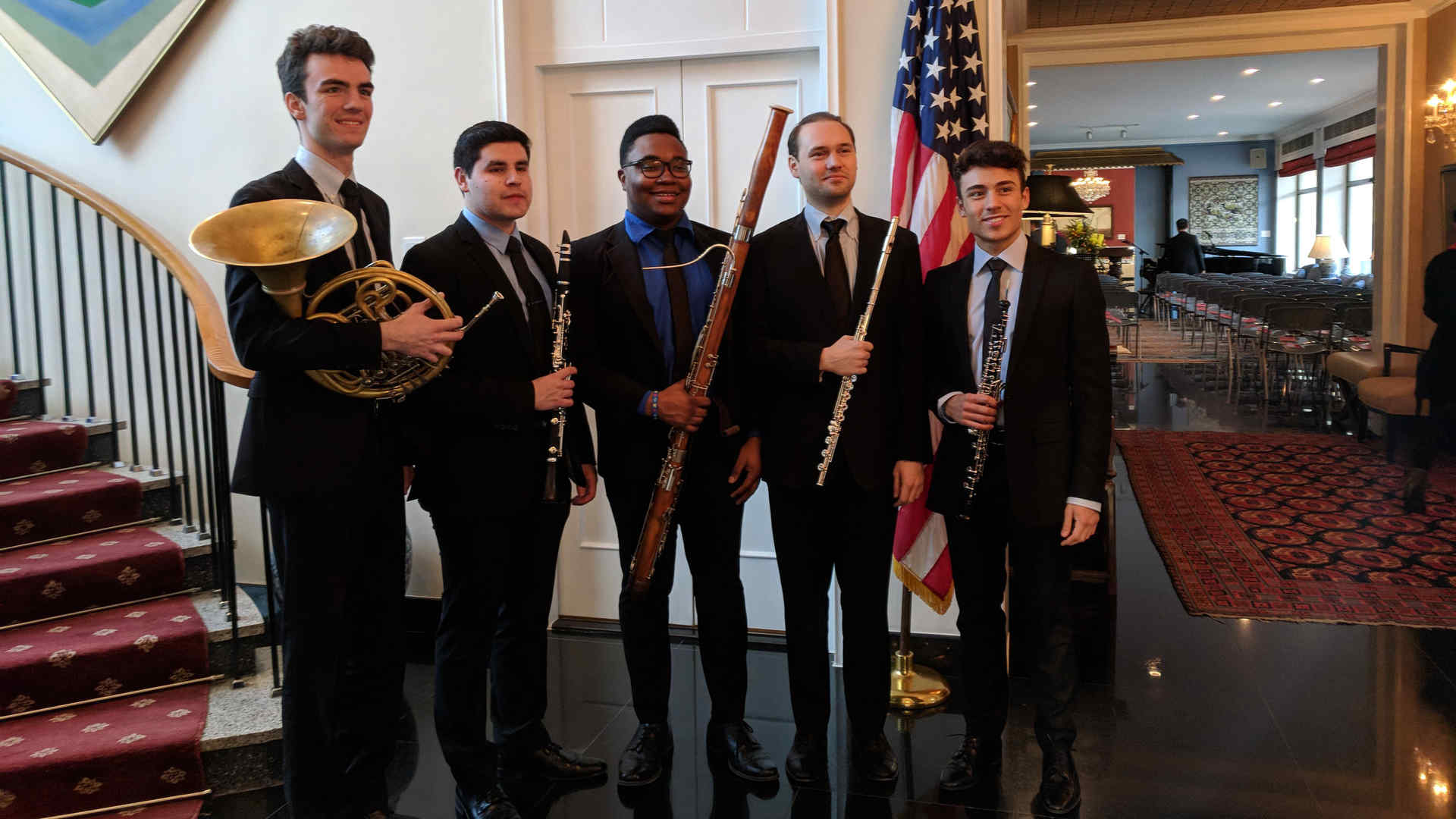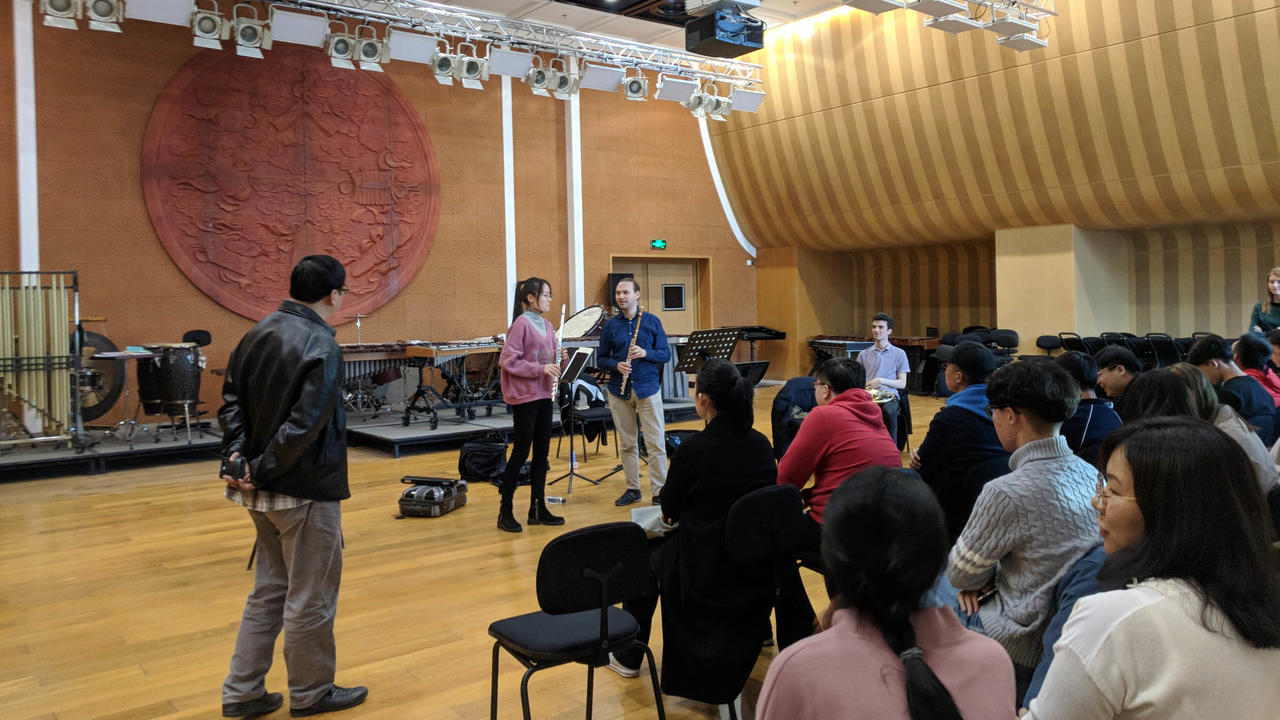
In March, Benjamin Sosland, an assistant dean, and five students—“superstars of stamina and good cheer”—flew to China for a few days of performances, exchanges, and tourism as the Tianjin Juilliard School continues to take shape. The students were David Alexander (horn), Giorgio Consolati (flute), Josh Elmore (bassoon), Hector Noriega (clarinet), and Bobby Nunes (oboe). Here’s an excerpt from the dispatches Sosland sent during the trip.
We started the performance part of our visit at the Beijing International Bilingual School (BIBA), whose pristine, modern facilities accommodate about 1,000 elementary and 500 high school students. During two presentations, the quintet played, spoke to, and interacted with the BIBA students like seasoned pros— with exquisite ambassadorship and generosity of spirit. While there was no end of hilarity when David showed the assembly how to buzz their lips to play the horn, the Q&A that followed was remarkably sophisticated, with even young kids asking about our students’ practice routines, when they fell in love with their instrument, and what daily life is like at Juilliard. The level of music training is very high at BIBA, and it was easy to see the possibility of future Pre-College students for the Tianjin Juilliard School there.

The primary reason for our trip was to play for Chinese and American dignitaries at the residence of the U.S. ambassador to China. The quintet opened with a stellar performance of music by Barber, Ewazen, and Piazzolla, followed by a gorgeous rendition of the first movement of the Brahms G Major Violin Sonata played by Wei He, the artistic director and dean of the Tianjin Juilliard School, and Xiaohan Wang, a member of its piano faculty. The concert concluded with a mesmerizing Chinese folk song played by a trio that brought together Wei, our flutist Giorgio Consolati, and the guqin virtuoso Chen Leiji. We were treated to warm American-style hospitality by Ambassador Terry Branstad and his wife, Christine.
One interesting challenge I think we can anticipate in Tianjin is adapting our Western approach to learning and teaching for students who are steeped in Chinese methods. I was reminded of this during an exchange between the quintet and music students at the middle school associated with the Tianjin Conservatory of Music (TJCM), our partner institution here. I find these types of events incredibly heartwarming: a room of young, eager Chinese students listening with reverence to our group. While we didn’t get many questions in the formal Q&A, after the session broke up, our students were swarmed. The TJCM bassoon students approached Josh for tips about vibrato; Bobby demonstrated oboe articulation techniques—this was one-to-one exchange in the most delightful and meaningful way.
Later that day, our quintet gave a public concert at TJCM. The turnout was good and I’m sure this was the first time many people in the audience had ever heard a wind quintet. Our gang was tickled to see their names written in Chinese on the promotional poster. After the performance, we decamped to a restaurant run by a former classmate of Wei’s (a clarinetist-turned-chef), and since it was Hector’s birthday, he was treated to an ice cream panda as the waiters circled him singing “Happy Birthday” in Mandarin.

One of the trip’s highlights was a tour of the construction site of our future campus. Walking through this massive skeleton of steel and concrete, you can start to see the concert halls and practice rooms taking shape. I was filled with a sense of possibility and optimism that one day the halls would be teeming with young musicians, and that the Juilliard banner would be flying proudly on the other side of the world. The design itself seems unbelievably complex, with hardly a right angle in sight. I had the sense that our presence really buoyed our administrative colleagues working to prepare for the opening of the school: they are working largely in the land of the theoretical and will likely continue to do so until the students are actually enrolled, starting in September with the first Tianjin Pre-College class.
Our last official activities took place at the China Conservatory of Music (CCOM): a concert and another exchange with students there consisting of impromptu orchestral excerpts classes (led by Bobby and Josh), a flute master class (taught by Giorgio) as well as a clarinet Q&A with Hector.
As the opening of the Tianjin Juilliard School approaches, I am more and more convinced that these types of exchange are essential, and who better to share the unique Juilliard experience than the beneficiaries of our style of teaching, our students? Their devotion to their craft and to our community, their individual and collective striving for personal and artistic excellence, their innate need to express themselves as creative artists, and their willingness to define creative enterprise on their own terms are continual sources of inspiration.
Benjamin D. Sosland (MM ’03, DMA ’08, voice) is the assistant dean for the Kovner Fellowships, administrative director of Juilliard Historical Performance, and a member of the college faculty